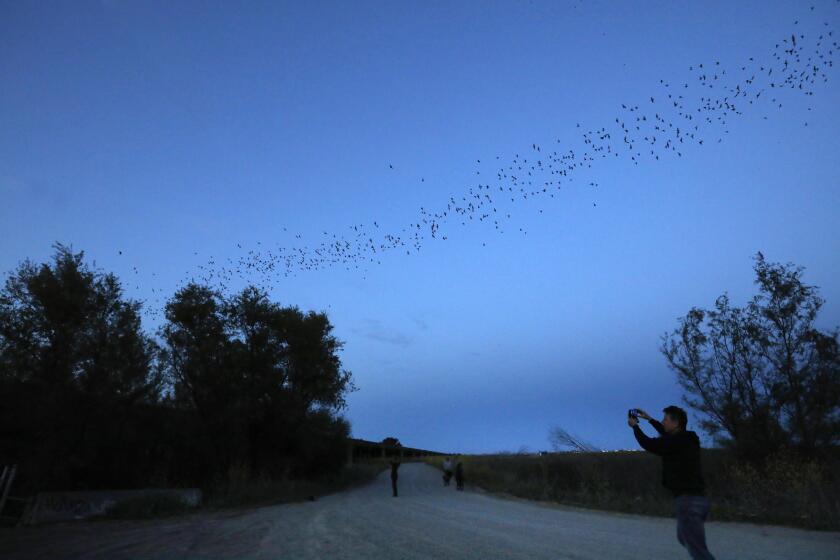Poll shows public support for Brown’s budget plan is slipping
Reporting from Sacramento — Public support for Gov. Jerry Brown’s plan to solve the budget crisis with a June election is eroding as other officials warn that delaying such a move until late fall, as the governor is considering, could trigger a cash crisis and a fresh round of state-issued IOUs.
A new survey from the independent Public Policy Institute of California shows that 46% of likely California voters back Brown’s call for a five-year extension on some sales, income and vehicle taxes to help balance the state’s books. Just two months ago, 53% of voters surveyed by PPIC said they would approve of the taxes.
The public appetite for a special election also seems to be on the wane. Fifty-one percent of respondents said they wanted one; in January, two-thirds said they welcomed an opportunity to vote on Brown’s proposal. The governor promised voters during his campaign last year that they could sign off on any tax hikes.
The survey suggests that even if Brown manages to hold a special election, selling the taxes to the public will not be easy. Ballot measures with less than 50% support before a campaign begins typically fail.
“While many Californians still favor the approach the governor proposed in January, his plan to seek a budget solution through a June ballot has become a more difficult task to achieve,” said PPIC President Mark Baldassare.
The fading public interest could further complicate Brown’s efforts to persuade the Legislature to place his tax measure on the ballot in June. That requires a two-thirds majority in each house, meaning at least four Republicans would have to say yes. So far, no GOP lawmakers have provided support.
In recent days, the governor has been exploring ways to take the tax question to Californians without Republican agreement. He is mulling a citizen initiative in November that would not require lawmakers’ involvement, or a legal loophole that some lawyers say would allow the Legislature to place the issue on the ballot without Republicans.
Either scenario would create additional political and legal hurdles for a tax proposal that the PPIC survey suggests already faces an uphill climb.
Brown acknowledged as much Wednesday. “Whichever way I look, I see bears in the forest,” he told reporters.
The state treasurer’s office added another danger Wednesday. Pushing back resolution of the budget until November, said spokesman Tom Dresslar, could leave the state unable to obtain the short-term loans from Wall Street that typically sustain the treasury until tax receipts arrive in the spring.
Officials could find themselves short of the cash needed to pay the state’s bills.
“You would be staring IOUs in the face,” Dresslar said.
Without a budget in place, finance officials could be unable to sell bonds that pay for the building and repair of roads, bridges and other public works. That could “threaten the shutdown of hundreds of infrastructure projects,” Dresslar said.
Still, the governor favors a November ballot measure if talks with GOP lawmakers break down, according to administration officials, who asked not to be named because they are not authorized to address the issue publicly. Negotiations continued Wednesday, and Brown said he still hoped a compromise could be struck.
“I continue to seek a bipartisan solution,” Brown said. “I’ve had some positive and friendly conversations, but there is not as yet a clear delineation as to what will seal the deal.”
Republicans have said they are seeking changes to the state’s pension rules and environmental regulations and a limit on future government spending before they will support a budget deal. Brown has characterized the GOP list as unrealistic.
The leader of the state Senate’s minority Republicans, Bob Dutton of Rancho Cucamonga, met with Brown in the Capitol on Wednesday, as did Sen. Anthony Cannella (R-Ceres). A group of GOP senators who have been negotiating with Brown for weeks were working with Dutton’s staff Wednesday on a potential compromise.
Sen. Bill Emmerson (R-Hemet), a member of the group, said Wednesday afternoon that some progress had been made, but no deal appeared imminent.
The two sides are under pressure to reach a deal. Brown prefers a June election so voters will be approving an extension of taxes that will all have expired by July 1. If an election on those same levies were held in November, the issue would be tax increases — a less palatable option, polls show.
Times staff writers Shane Goldmacher and Evan Halper contributed to this report.
More to Read
Sign up for Essential California
The most important California stories and recommendations in your inbox every morning.
You may occasionally receive promotional content from the Los Angeles Times.










